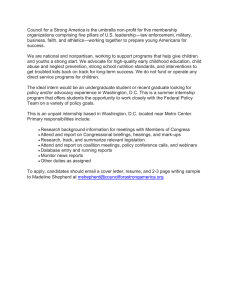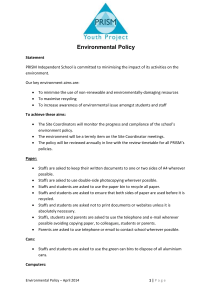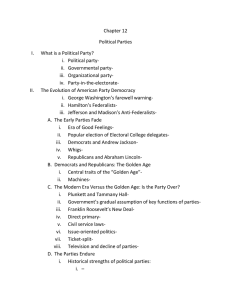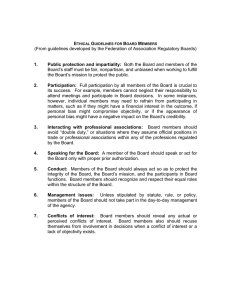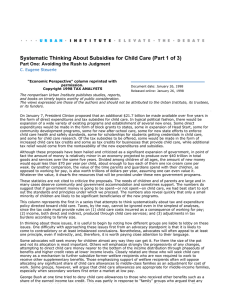Half-Truths and the Development of Tax Policy C. Eugene Steuerle
advertisement
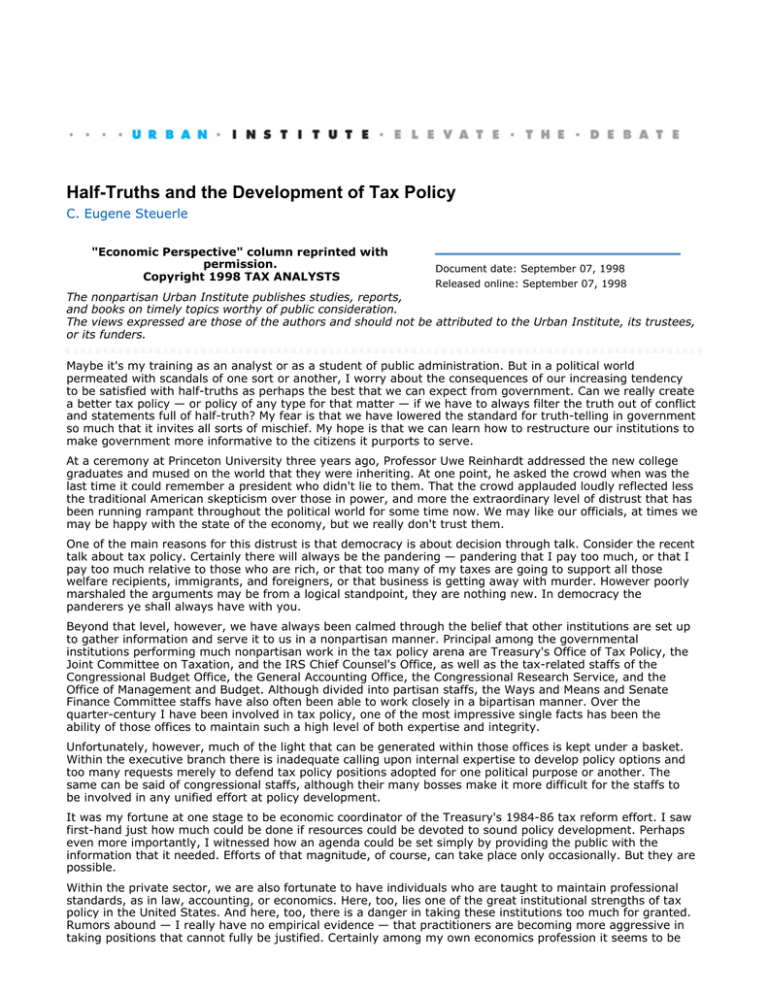
Half-Truths and the Development of Tax Policy C. Eugene Steuerle "Economic Perspective" column reprinted with permission. Copyright 1998 TAX ANALYSTS Document date: September 07, 1998 Released online: September 07, 1998 The nonpartisan Urban Institute publishes studies, reports, and books on timely topics worthy of public consideration. The views expressed are those of the authors and should not be attributed to the Urban Institute, its trustees, or its funders. Maybe it's my training as an analyst or as a student of public administration. But in a political world permeated with scandals of one sort or another, I worry about the consequences of our increasing tendency to be satisfied with half-truths as perhaps the best that we can expect from government. Can we really create a better tax policy — or policy of any type for that matter — if we have to always filter the truth out of conflict and statements full of half-truth? My fear is that we have lowered the standard for truth-telling in government so much that it invites all sorts of mischief. My hope is that we can learn how to restructure our institutions to make government more informative to the citizens it purports to serve. At a ceremony at Princeton University three years ago, Professor Uwe Reinhardt addressed the new college graduates and mused on the world that they were inheriting. At one point, he asked the crowd when was the last time it could remember a president who didn't lie to them. That the crowd applauded loudly reflected less the traditional American skepticism over those in power, and more the extraordinary level of distrust that has been running rampant throughout the political world for some time now. We may like our officials, at times we may be happy with the state of the economy, but we really don't trust them. One of the main reasons for this distrust is that democracy is about decision through talk. Consider the recent talk about tax policy. Certainly there will always be the pandering — pandering that I pay too much, or that I pay too much relative to those who are rich, or that too many of my taxes are going to support all those welfare recipients, immigrants, and foreigners, or that business is getting away with murder. However poorly marshaled the arguments may be from a logical standpoint, they are nothing new. In democracy the panderers ye shall always have with you. Beyond that level, however, we have always been calmed through the belief that other institutions are set up to gather information and serve it to us in a nonpartisan manner. Principal among the governmental institutions performing much nonpartisan work in the tax policy arena are Treasury's Office of Tax Policy, the Joint Committee on Taxation, and the IRS Chief Counsel's Office, as well as the tax-related staffs of the Congressional Budget Office, the General Accounting Office, the Congressional Research Service, and the Office of Management and Budget. Although divided into partisan staffs, the Ways and Means and Senate Finance Committee staffs have also often been able to work closely in a bipartisan manner. Over the quarter-century I have been involved in tax policy, one of the most impressive single facts has been the ability of those offices to maintain such a high level of both expertise and integrity. Unfortunately, however, much of the light that can be generated within those offices is kept under a basket. Within the executive branch there is inadequate calling upon internal expertise to develop policy options and too many requests merely to defend tax policy positions adopted for one political purpose or another. The same can be said of congressional staffs, although their many bosses make it more difficult for the staffs to be involved in any unified effort at policy development. It was my fortune at one stage to be economic coordinator of the Treasury's 1984-86 tax reform effort. I saw first-hand just how much could be done if resources could be devoted to sound policy development. Perhaps even more importantly, I witnessed how an agenda could be set simply by providing the public with the information that it needed. Efforts of that magnitude, of course, can take place only occasionally. But they are possible. Within the private sector, we are also fortunate to have individuals who are taught to maintain professional standards, as in law, accounting, or economics. Here, too, lies one of the great institutional strengths of tax policy in the United States. And here, too, there is a danger in taking these institutions too much for granted. Rumors abound — I really have no empirical evidence — that practitioners are becoming more aggressive in taking positions that cannot fully be justified. Certainly among my own economics profession it seems to be getting harder to find truly nonpartisan analysis, partly because so many studies are financed by individuals looking for particular answers. Lowering standards would hardly be new to our modern society. Sen. Daniel Patrick Moynihan, D-N.Y., had a great phrase for our modern moral expectations when he talked of "defining deviancy down." In this case, the deviancy to be avoided is defining the half-truth as truth. The half-truth, as I am using it here, is the partial story that doesn't actually lie, it just conveniently leaves out a lot of information. The half-truth, of course, has a role to play. When political figures put forward a position, they will typically present information only about the benefits of their proposed changes, not the costs. This has long been an acceptable standard, whether in law or politics. Present your best case and let the other side present its own. An informed citizenry or jury can then decide which position is better. The difficulty with this approach to determining the truth or making decisions as a society is that it emphasizes adversarial relationships. Yet we know that advances in knowledge often require a higher level of trust among parties. Scientific research, for example, typically must be collaborative, or advances will be much slower and less sure. Any family or community that does not have a bond of trust among its members, some ability to move beyond adversarial relationships, will quickly become dysfunctional. Much the same is true for government. The issue, then, is not about the usefulness of adversarial relationships. They clearly serve a purpose. It is that when the half-truth becomes a dominant form of communication, it corrodes societal understanding. One reason we appear to be so confused about tax policy these days is that the half-truth has been pushed too far and has usurped the traditional role of nonpartisan analysis and investigation. What can be done? I believe it is time to begin to reinforce institutions whose ethic and mission is related to truth gathering rather than advocacy. Here are a few practical ways to achieve that goal. Reduce considerably the size of political staffs in government — or at least redefine political positions to emphasize information gathering rather than advocacy. Tax policy offices fortunately have a fairly low level of political appointees, but their messages must still get through too many political staff at the White House (as well as some other departments), who have limited agendas, more of a bias toward the halftruth, get in the way of information processes, inundate the Treasury Secretary with politically based requests, and deter more important work of the department. Strengthen even more the status of agencies and groups set up and organized to provide information in a nonpartisan manner, such as the Office of Tax Policy, Joint Committee on Taxation, Congressional Budget Office, and so forth. Reinforce them in efforts to put out studies. Purposefully direct efforts toward establishing within each office of government a set of standards and expectations for the office and its mission. These efforts should be made explicitly and formally, not just learned through happenstance. A newcomer to an important tax policy (or other government) office should be made aware of its history, integrity, and high professional standards. Esprit de corps, of course, still must be passed on through practice, not merely claims. Establish nonpartisan or bipartisan private boards and committees to review the studies and testimonies and statements put out by different parts of government. Call to task any gross violation of reasonable standards for accuracy. Finally, much relies on each of us to maintain our own integrity in reporting, studying, filing tax returns, or whatever else we do. Sure, some clients and politicians can demand that only half-truths be issued when we speak on their behalf. But not when we speak for ourselves. We can also restore a higher standard of expectation for government and demand that it be met. Other Publications by the Authors C. Eugene Steuerle Usage and reprints: Most publications may be downloaded free of charge from the web site and may be used and copies made for research, academic, policy or other non-commercial purposes. Proper attribution is required. Posting UI research papers on other websites is permitted subject to prior approval from the Urban Institute—contact publicaffairs@urban.org. If you are unable to access or print the PDF document please contact us or call the Publications Office at (202) 261-5687. Disclaimer: The nonpartisan Urban Institute publishes studies, reports, and books on timely topics worthy of public consideration. The views expressed are those of the authors and should not be attributed to the Urban Institute, its trustees, or its funders. Copyright of the written materials contained within the Urban Institute website is owned or controlled by the Urban Institute. Source: The Urban Institute, © 2012 | http://www.urban.org
